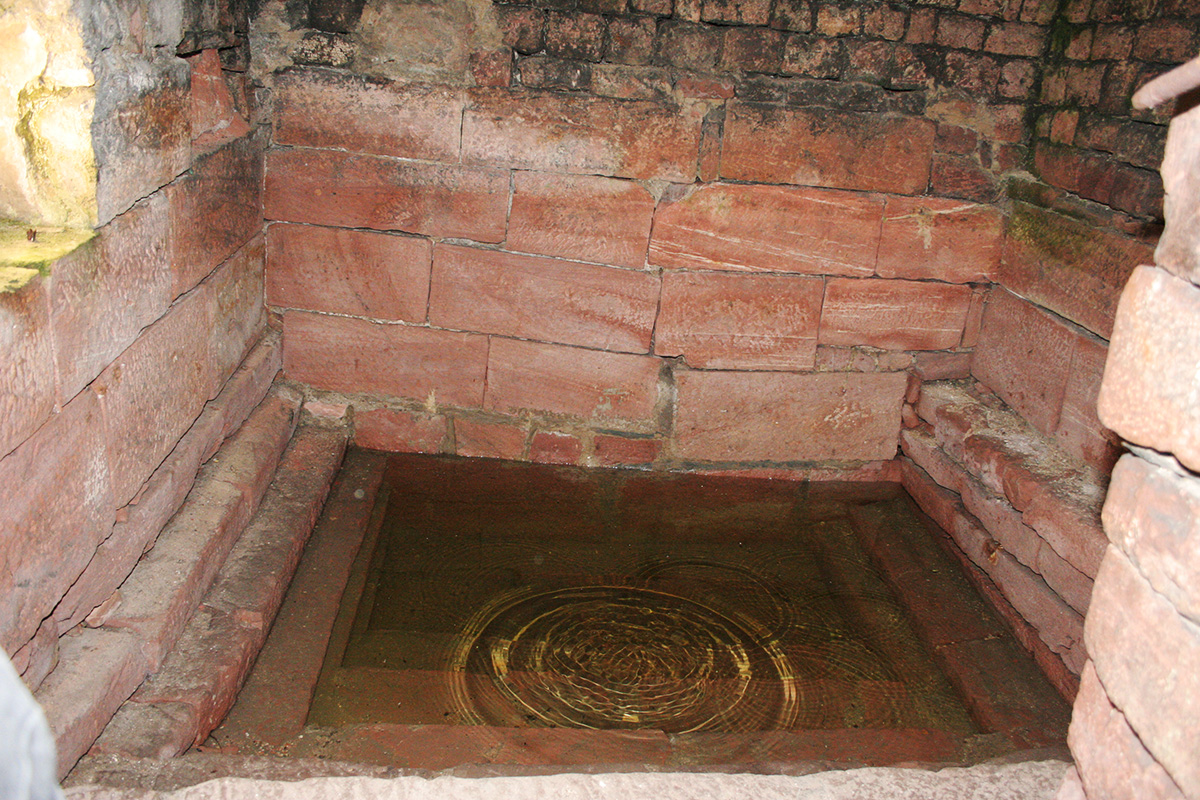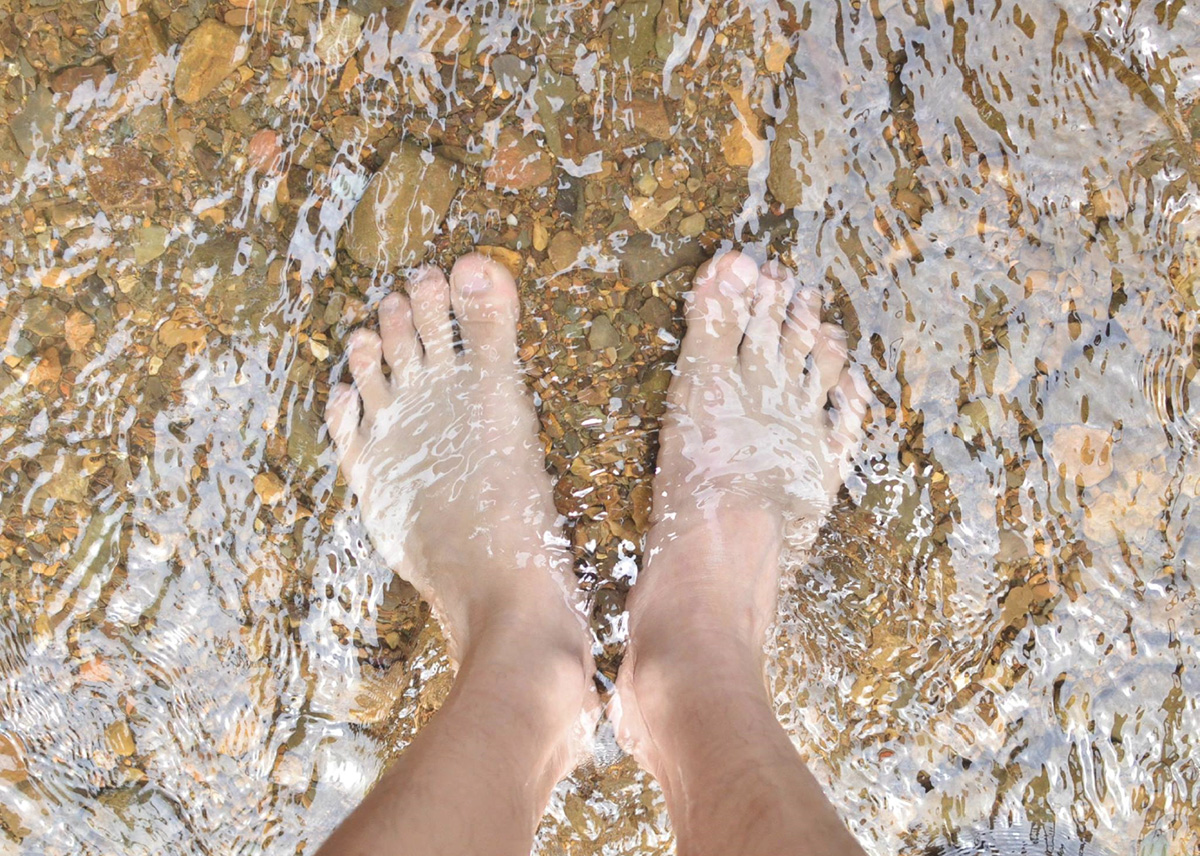
Baruch ata adonai eloheinu melech ha-olam asher
kid-shanu b‘mitzvo-tav v‘tzi-vanu al ha-tevilah.Blessed are You, Adonai, Ruler of the Universe, Who
has sanctified us with the mitzvot and commanded
us concerning immersion.

Ritual baths are part of the Jewish tradition. Baths were already discovered during excavations in antiquity. Antique Mikvaot can be seen i.e. on Masada and in Korazin in Israel.
A partial warming of the water in a MikvehAccumulation of water
מקוה which for instance is fed by a well by scooping warm water to it is generally possible. In the course of centuries different techniques have been developed. Modern Mikwaot from the middle of the 20th century mostly offer warm water apart from hygienic standards such as tiled basins.
For the ritual purityTahor
טהור Tahor
טהור of a Jewish community a Mikwe is essential. Therefore, a ritual bath is more important than the construction of a synagogue. This is what it says in the Talmud (Megilla 27a), this is what the Halacha, the Jewish religious law (Igrot Moshe, Choschen Mischpat 1,42), provides for.
The mikveh serves the attainment of ritual purity by immersion in living waterWell
מַעֲיָן. How can water be alive? Living water is groundwater, spring water, rainwater, meltwater, river water. Lakes with stagnant water are not adequate. If possible, one shall not use rivers as mikvaot (Schulchan Aruch, Jore Dea 201,2). This was discussed again especially after the Crusades and the forced baptisms in rivers.
The immersion pool in a mikveh should at best contain about 1000 litres of water. Before visiting a mikveh, it is important to clean the body thoroughly. The pure water shall not be contaminated by anything foreign to the body: not by make-up, jewellery, prostheses.
Prayers are said before, during and after the three immersions.
Everything that became impure, be it human beings, be it objects,… can become pure again only by submerging… in water.
Maimonides: Hilkhoth miqwa’oth in: Yad ha-chazaqqah
A Mikveh is mainly visited by women. As religious jewish women, they immerse into the water before the wedding, on the seventh day after menstruation, or after the birth of a child. Before the beginning of Shabbat immersing often belongs to the preparations for the weekly day of rest.
Whoever converts to Judaism, completes the conversion by immersing in the Mikveh.
Many law-abiding Jewish men regularly visit a mikveh. Nowadays, there is no explicit Torah obligation for a man to immerse into the water. In the course of time, however, customs have developed, and many men go to the mikveh before the high holidays. Some visit a mikveh before every Shabbat or holiday, Hassidim almost every day.
New crockery and kitchen utensils for orthodox households and kitchens should also be immersed in the Mikveh to be pure.
The Mikveh traditionally a room for married and procreative women causes discussions nowadays. Some interprete the commandments for women are seen as a lack of equality or an affront towards women not able getting pregnant or after the meno pause. Some young Jewish women and feminists develop very personal rituals, even after harsh or traumatic events in life. In recent decades, the mikveh is seen as a place of female spirituality, too.
In the Talmud (Kiddushin 30a) it says that G"d himself is the mikveh for the Jewish people who purifies them when their hearts are turned to him.
A mikveh is a space in which everything is in flux. Where all thoughts can flow and develop.
To my lover
I weave a hymn of love and joy to you
to be one with you is all that I desire,
to be sheltered in the shadow of your hand
to know the hidden mystery of your fire.
So, God, drape me in the fragrant sheets of heaven.
Bind my clothes with cords of satin, soft as a dove.
Braid my hair as you did Eve‘s once in Eden.
And send your angels to guide me safely to my love.Excerpts from Tears of Sorrow, Seeds of Hope
©1999 by Nina Beth Cardin (Woodstock,VT: Jewish Lights Publishing).
Online at www.jewishlights.com. (Source)

Water is the source of life; everything depends on water. This is why you have to cover yourself with water if you want to make a new beginning like the world was covered with water when G’d created it.
Mendel Schtroks: Mikwe. Grundstein jüdischen Lebens, Köln 2010, S. 19